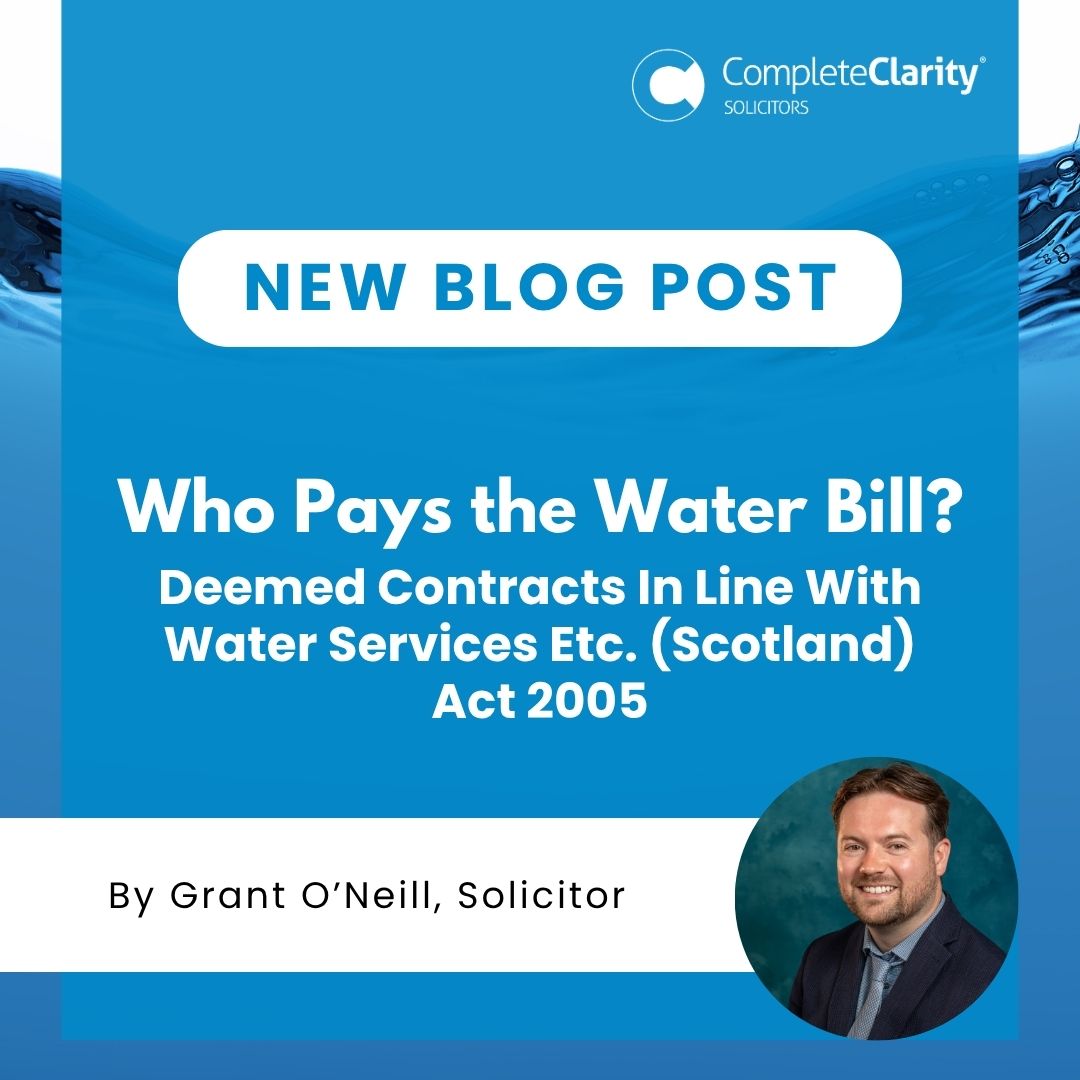
When water or sewerage services are supplied to a commercial premises in Scotland, it is not always the case that the occupier or owner has actively entered into a written contract with a water services provider. Instead, the Water Services etc. (Scotland) Act 2005 provides for what are known as “Deemed Contracts”. These arise automatically where services are being used but no express agreement is in place. Understanding how these contracts work—and importantly, who is liable—is crucial for landlords, tenants, and commercial property managers.
Key Provisions of the Water Services Etc. (Scotland) Act 2005
To my mind, the key sections of the Water Services Etc. (Scotland) Act 2005, run from sections 20A through to 20D.
Section 20A outlines essentially that, in respect of business premises whereby water or sewerage services are provided and where no other explicit contract exists, there is automatically assumed or deemed to be a contract between the Licenced Provider company and the occupier.
The Licenced Provider company is ultimately an off-shoot of Scottish Water, whereby Scottish Water is the wholesaler.
The occupier meanwhile, is usually a commercial tenant, but if the premises are vacant or empty, liability falls to the owner or landlord.
Interestingly, the reported case of Castle Water Ltd v Kemble Estates Ltd found that, a tenant must physically occupy the premises, in order to be held as liable. It is not enough for a landlord to simply allow a lease to continue running, even after the tenant has physically left the premises.
In terms of section 20B meanwhile, this provision assists in terms of regulating invoicing, costing, and tariffs. Frustratingly for the liable party, a minimal charge is often applied, even if water usage is minimal.
Under section 20C moreover, an owner or landlord is obliged to inform the Licenced Provider of whom any new tenant is, including details as to when the lease commenced.
Section 20D interestingly provides that, if a landlord fails to comply with section 20C, they can be held as jointly and severally liable together with any new tenant.
Role of Various Agencies
As aforementioned, Scottish Water can be thought of as the wholesaler whom delegates duties to various private companies known as Licenced Providers. This process pertains to commercial units only such as car washes; shops; hotels; restaurants; takeaways; and so on. Private water and sewerage bills are, on the other hand, addressed via Council Tax, although certain different rules apply to properties with hybrid commercial and residential elements.
Scottish Water can often step-in, in matters of dispute, and can assist with site visits, investigations and checking of drainage connection points via ‘dye tests.’
Meanwhile, the Central Market Agency (CMA) and Scottish Assessors Association (SAA), play a key role. The CMA is tasked with the allocation of supply points, known as S.P.I.Ds, to the Licenced Providers at random. The S.P.I.D is a special code unique to each individual drainage point. The SAA meanwhile, is tasked with setting rateable values of commercial premises. The Licenced Providers thereupon issue their invoices to the occupier, in line with said rateable values. The SAA database is a fairly useful resource, as it indicates whom is listed as landlord and tenant for each commercial premises in Scotland. It is a public database.
Where a written, bespoke contract does not exists between the owner (in cases of a vacant premises); or tenant (in cases of an occupied premises); and the Licenced Provider, a Deemed Contract is assumed to exist, and its conditions are set by the aforementioned sections 20A – 20D. As an alternative, a bespoke contract can be signed. The bespoke contract may be more affordable when compared to the default tariffs which apply in respect of Deemed Contracts. Any re-payment in a court action, towards unpaid Deemed Contracts, ought to include payment towards arrears and ongoing costs.
Conclusion
Navigating water charges for commercial properties can be complex, particularly where liability shifts depending on occupancy and the obligations on landlords to notify Licenced Providers of tenant changes. The Deemed Contract regime ensures continuity of supply but can lead to unexpected liability if its provisions are not well understood. Whether you are a landlord concerned about exposure to joint liability or a tenant wishing to ensure your charges are fair and correctly applied, clarity at the outset is key.
At Complete Clarity, our team is here to provide clear, expert advice designed to meet your needs and help you make informed decisions. Contact us today at 0141 433 2626 to speak with one of our experts.
By Grant O’Neill, Dispute Resolution Solicitor

